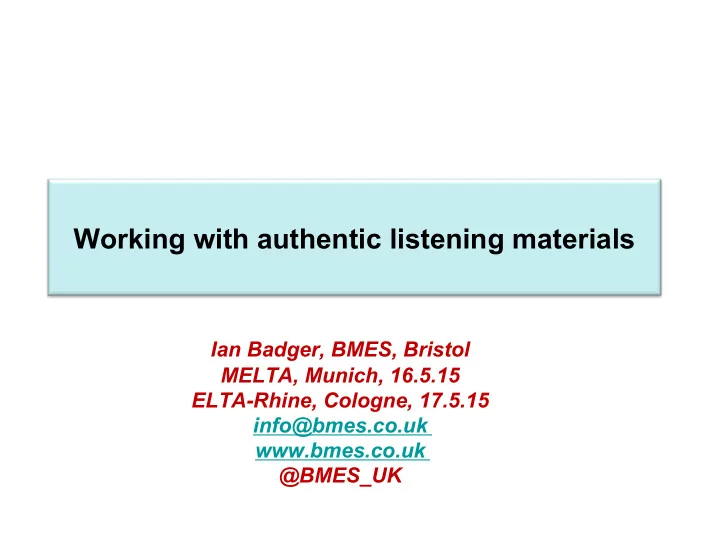

Working with authentic listening materials Ian Badger, BMES, Bristol MELTA, Munich, 16.5.15 ELTA-Rhine, Cologne, 17.5.15 info@bmes.co.uk www.bmes.co.uk @BMES_UK
To cover.. • Arguments for and against using authentic recordings • Tailoring the materials to learner needs • Exploiting a listening text • Features specific to authentic recordings • Examples of published Collins authentic recordings • Introduction to the Business Listening app for Ipad • Summarising – pooling our experiences
Fun and understanding! • We need to build a Russian ship • It’s all about the interpaces • How ve dolop de project? • We work with agile management • First we will stop at derminal do! • There’s been a rabbit increase
Some questions • What are the main arguments for using authentic materials in our teaching? • What are the main arguments against using them? • Do you record your own materials – video, audio? If not, why not? • How have your learners responded to working with authentic listening materials?
“We don’t understand our Spanish office!” – tailoring the materials to needs A Spanish customer service manager
Working with a listening text
Setting the scene • Do you think that the responsibility for clear comprehension lies with the speaker or listener? • Do other speakers have difficulty in understanding your accent? What efforts do you make to help them? • Should native speakers modify their accents? Should they limit the complexity of the language which they use? • Give examples of when you have found it very difficult to understand other speakers, or situations where other speakers have not been able to understand you!
Pre-listening • Have you visited Ireland / Northern Ireland? • What do you know about the history of Ireland? • How do you feel about Seamus’s views on ‘anglicising’ his accent? • Do you believe that changing your accent is a betrayal of an individual’s linguistic/cultural identity?
Recordings from Collins English for Business Listening Unit 1 • Seamus 1 • Seamus 2
Specific language focus: contracted and uncontracted forms • Note the contractions used ( I’ve rather than I have , They’re rather than They are etc.) • Do you encourage your learners to use contracted or uncontracted forms? Why? Why not? • Other issues from the recording?
Particular features of ‘authentic’ recordings
Some uses of ‘will’ Occasionally I will take a client out for lunch. The rear garden is south-facing so you’ll get the sun most of the day. You have somebody to cook for you. A lady will come in the morning to wash your clothes. I will recommend you the Peking duck.
Idiomatic expressions I put up with the hassle of the day-today commute I’m sat on the M25 doing no miles an hour. They look after the nitty-gritty I may have been cc’d or forwarded There’s a whole mix of making sure you don’t drop any balls in the process, ‘cos you can’t let anything slip.
‘ Mistakes’ Italian people is really people with a good fantasy – happy people I explain structure of the building. Then I take them down to canteen. I called a manager in German. Because his English is not very good because he’s not English native speaker so his pronunciation is maybe hard for me to understand. I would say if somebody care of what you are doing, he will probably challenge you and ask you a lot of question.
• Further examples of authentic listening materials – for the classroom and self study (c) Ian Badger BMES, Bristol
French eating habits From ‘Collins English for life’ Listening B2 Registering for a GP in the UK Listening B2 An American view of tea and coffee From ‘Collins English for drinking Business’ Listening Irish business practices Business Listening An English attitude to wearing a coat From ‘Collins English for on a cold evening Life’ Listening B1 A Saudi attitude towards dogs Listening B2
Authentic listening – Collins app for self study/classroom use
Working with authentic materials: References and resources • Badger, I English for Life ‘Listening’ B2+ Collins ELT 2014 • Badger, I English for Life ‘Listening’ B1 Collins ELT 2012 • Badger, I English for Business ‘Listening’ Collins ELT 2011 + App for I Pad 2012 • Walker, R. ‘Teaching the pronunciation of English as a Lingua Franca’, OUP 2010 • Wilson, JJ. How to teach listening, Pearson 2008 • http://www.collins.co.uk • - Additional authentic recordings + learner/trainer resources to accompany “English for Business” and “English for Life” Listening • http://accent.gmu.edu - People from around the world recording the same paragraph in English • http://sounds.bl.uk/Accents-and-dialects – Examples of regional UK accents and dialects • http://www.languagebyvideo.com - English accents around the world Ian Badger BMES, Bristol. www.bmes.co.uk
Recommend
More recommend